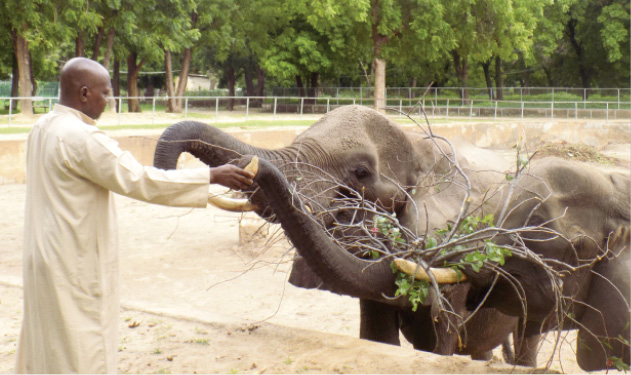‘How I’ve been caring for 2 elephants for 4 years’
Bukar Babagana caters for the two elephants assigned to him with striking fondness between him and both of them. But there are hazards. It was about 10 am. The bright sun provided a pleasant view of the spacious quadrangle housing the two beasts situated right at the heart of the park. Bukar Babagana stood […]

Bukar Babagana feeding two of the elephants PHOTO: Uthman Abubakar
Bukar Babagana caters for the two elephants assigned to him with striking fondness between him and both of them. But there are hazards.
It was about 10 am. The bright sun provided a pleasant view of the spacious quadrangle housing the two beasts situated right at the heart of the park.
Bukar Babagana stood outside, clutching the wire of the perimeter fence of Jimmai’s and Izge’s ‘house’, watching with fascination Jimmai busying herself on her sumptuous breakfast – fresh neem tree branches cut down and heaped before her just a couple of minutes before our arrival.
‘Jimmai!’ Babagana called. On her breakfast table about 30 meters away, she pretended not to have heard his calls, enjoying her breakfast.
A short moment after, Jimmai raised her head, focused her firm gaze directly on the hands of Babagana from the distance. He had stretched out his empty hands as though he were holding some eatables, to lure her. But she observed they were empty, so she stooped back to her meal.
Babagana hastened to the well-treed surroundings, searched for some eatables and hastened back. He called again, and she raised her head, but this time avoiding falling for his pranks. As she saw something this time, she headed towards him, carrying her massive weight, dangling her trunk. She stretched her trunk directly to the hands of her keeper, and snatched the two crackers. She crunched, dimming her eyes.
About 20 meters away, the other elephant, Izge, had heaped her own massive weight on the ground, perhaps taking some recess from the roaming around.
Babagana and his two wards seem happy, with a strong, pleasant mutual understanding. They are excited to see him, so long as he comes bearing eatable gifts as he carries out the only daily household chore of cleaning their mess.
As a caring keeper, Babagana knows when any of them fall ill, and he immediately notifies the park management.
Jimmai, the older elephant was so named because she was captured on a Friday (Juma’at) deep in the Gwoza jungle in Borno State in 1978. Izge derived her own name from the Izge jungle in the vicinity of Gwoza, where she was captured in 1983. Since then, the two beasts have been the ‘queens’ of Sanda Kyarimi Park, Maiduguri.
Babagana has been their keeper for four years now, the duty assigned to him by the park management due to his understanding of the psycho-emotional well-being of the wildlife, which he acquired partly because he had lived with and catered for many of them for about 25 years.
“I was at the Lake Chad Sanctuary in Baga LGA, in the vicinity of Lake Chad, for 20 years,” Babagana began. “My work there was the protection and control of the entire wildlife. In the expansive sanctuary covering a large area of the Nigerian portion of the lake, there are hippos, monitor lizards, gazelles and many other wild animals; I was there for 20 years, controlling and protecting the wide range of wildlife there against poachers, up to the time I was transferred here four years ago. I was bitten by snakes several times in the sanctuary, and we were often attacked by baboons. Also, the Chadian wildlife workers would also often accost us hostilely while guarding their country’s portion of the sanctuary, mistaking us for thieves or poachers. But that was before they got used to us. We would then exchange greetings and everyone would go about his work. They guard their country’s portion, hiding in treetops and using binoculars, which we don’t have.”
Babagana and his unenviable job seem married to each other – consider the fondness between him, Jimmai, and Izge. But the job is hazardous in terms of both remuneration and potential hazard from the animals. “We’re not well-catered for in terms of remuneration and other conditions of service,” he complains. “When the animals visit their hostility on you, even to the point of incapacitation, you are on your own; nobody pays you a dime for medication. I had a colleague who was hit by an elephant so hard that he got incapacitated; in this state of incapacitation, he was retired without anyone giving him a dime.”
Such is the working life of the wildlife keeper, Babagana Bukar, who caters for Jimmai and Izge at the Sanda Kyarimi Park, Maiduguri.
